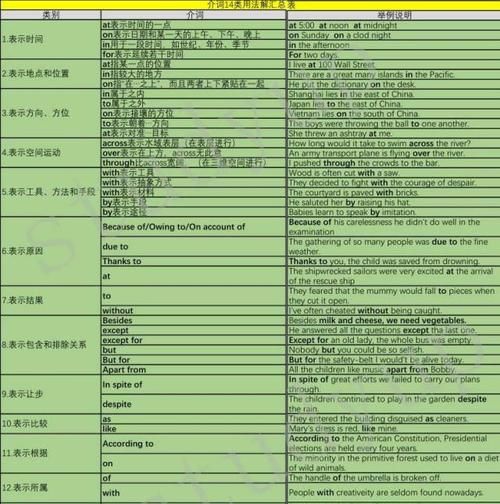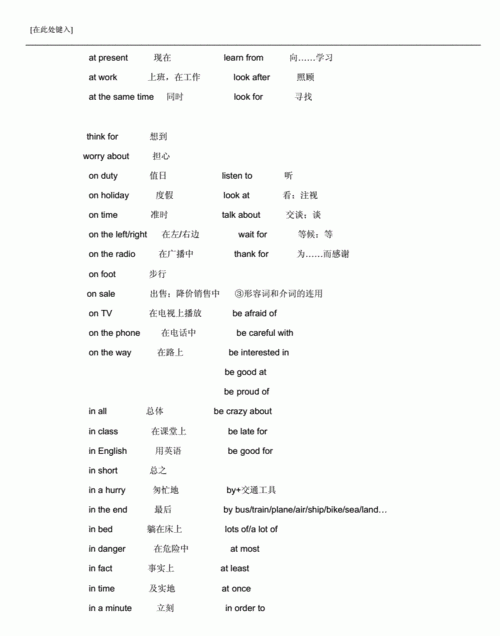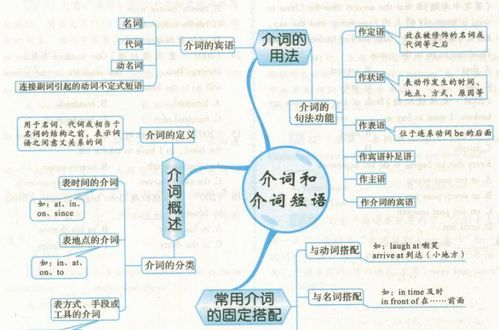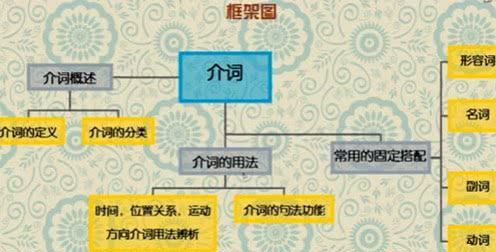本文目录
介词的基本分类
介词是英语中常见的词性,为了对介词的用法有一个系统性的学习,给大家总结了介词的用法,记得收藏哦!
介词的定义和种类
介词是一种用来表示词与词,
或者词与句之间的关系的词,在句中不能单独作句成分。介词一定要有宾语,充当宾语的一般有名词、代词或相当于名词的其它词、短语或句子,短语或从句。
2. 介词的种类
(1)简单介词,如at, in off, on, by, to,
with等。
(2)合成介词,如into, inside, within,
throughout等。
(3)短语介词,如according to, because of,
in addition to, in front of, in spite of等。
(4)二重介词,如from behind, from among,
until after, at about等。
3. 介词的宾语
(1)名词:Let's go for a walk along
the river. 咱们到江边散散步。
(2)代词:He's standing in front of
me. 我站在我前面。
(3)形容词:Her pronunciation is far
from perfect. 她的语音远不是完美的。
注:有的形容词前可看作是省略了being。
(4)动名词:He's good at drawing.他善长绘画。
(5)过去分词:I took it for granted that
she was for England.我还以为她是英国的。
注:过去分词作介词宾语只限于take…for granted
结构和用于regard…as后。
(6)不定式:I had no choice but to lie
down. 除了躺下外我别无选择。
She did nothing but cry.她只是哭。
注:介词后通常是不能用不定式作宾语的,只有表示“除……外”的
but, except 等个别介词能接不定式作宾语。前面有行为动词do时,不定式不用 to,否则要带to。
(7)疑问词+不定式:I don't know how to
improve my English.我不知道如何提高我的英语水平。
(8)副词:I didn't know it until
recently. 直到最近我才知道此事。
(9)数词:He was among the first to
arrive. 他是第一批到的。
(10)介词短语:She won't go home until
after the exam. 她要考完试之后再回家。
(11)从句:Think of what I said.
想想我说的话(from ***)。
I'm worried about where he is.
我担心他上哪儿去了。
I have doubts about whether(不用if)
he is the best man for the job. 我怀疑他是否做这项工作的最好人选。
He has no special fault except
that he smokes too much.他除了抽烟太多之外,没有什么特别的毛病。
注:除except that, in that等后可接that从

英语中所有介词的用法归纳
1.表示地点位置的介词
1)at ,in, on, to
at (1)表示在小地方; (2)表示“在……附近,旁边”
in (1)表示 在大地方; (2)表示“在…范围之内”。
on 表示毗邻,接壤
to 表示在……范围外,不强调是否接壤
He arrived at the station at ten.
He is sitting at the desk.
He arrived in Shanghai yesterday.
Jiangsu lies in the east of China.
Russia lies on the north of China.
Fujian is to the south of Jiangsu Province.
2)above, over, on 在……上
above指在……上方,不强调是否垂直,与below相对;
over指垂直的上方,与under相对,但over与物体有一定的空间,不直接接触。
on表示某物体上面并与之接触。
The bird is flying above my head.
There is a bridge over the river.
He put his watch on the desk.
3)below, under 在……下面
under表示在…正下方
below表示在……下,不一定在正下方
There is a cat under the table.
Please write your name below the line.
2.表示时间的介词
1)in , on,at 在……时
in表示较长时间,如世纪、朝代、时代、年、季节、月及一般(非特指)的早、中、晚等。
如in the 20thcentury, in the 1950s, in 1989, in summer, in January, in the morning, in the night, in one’s life , in one’s thirties等。
on表示具体某一天及其早、中、晚。
如on May 1st, on Monday, on New Year’s Day, on a cold night in January, on a fine morning, on Sunday afternoon等。
at表示某一时刻或较短暂的时间,或泛指圣诞节,复活节等。
如at 3:20, at this time of year, at the beginning of, at the end of…, at the age of…, at Christmas,at night, at noon, at this moment等。
注意:在last, next, this, that, some, every等词之前一律不用介词。如:We meet every day.
2)in, after 在……之后
“in +段时间”表示将来的一段时间以后;
“after+段时间”表示过去的一段时间以后;
“after+将来点时间”表示将来的某一时刻以后。
My mother will come back in three or four days.
He arrived after five months.
She will appear after five o’clock this afternoon.
3)from, since 自从……
from仅说明什么时候开始,不说明某动作或情况持续多久;
since表示某动作或情况持续至说话时刻,通常与完成时连用。
He studied the piano from the age of three.
They have lived here since 1978.
4)after, behind 在……之后
after主要用于表示时间;
behind主要用于表示位置。
We shall leave after lunch.
Lucy is hiding behind an old house.
3.表运动方向的介词:across, through 通过,穿过
across表示横过,即从物体表面通过,与on有关;
through穿过,即从物体内部穿过,与in有关。
She swam across the river.
He walked through the forest.
4.表示“在……之间”的介词:between, among
between指在两个人或两个事物之间;
among指在三个或三个以上的人或事物之间。
There is a football match between Class One and Class Two on the playground.
The teacher is standing among the students.
5.表示其他意义的介词
1)on ,about 关于
on 表示这本书,这篇文章或演说是严肃的,或学术性的,可供专门研究这一问题的人阅读;
about表示内容较为普通,不那么正式。
There will be a lecture on economics this afternoon.
He is writing a book on cooking.
He told me a lot about his life in the summer vocation.
2)by, with, in 表示方法、手段、工具
by以……方法、手段或泛指某种交通工具;
with表示用 …工具、手段,一般接具体的工具和手段;
in表示用…方式,用…语言(语调、笔墨、颜色)等;
He makes a living by selling newspapers.
He broke the window with a stone.
The foreigner spoke to us in English.
3)except, besides 除了
except除……之外,不包括在内;
besides除……之外,包括在内。
Except Mr. Wang, we went to see the film.(王先生没去)
Besides Mr. Wang, we also went to see the film.(王先生也去了)
参考自英语教学网,希望对你有用

英语介词的用法
上一讲,我们讲了形容词和副词。这一讲我们来学学介词。
介词为虚词,不能单独充当句子成分,必须同名词、代词、短语、句子构成介词短语,才能充当句子成分。介词短语在句中常作表语、定语、状语和补足语。介词的用法比较复杂,在英语学习中须多多注意。 想看基础知识,请看介词。
下面我们来学点介词口诀。帮你快速记单词。
一、介词及介词短语
介词像个“游离体”, 名前动后常出现,
一旦组成“某结构”, 句中成分有一位。
“介+宾”叫“介短”, 作“形、副”句里边。
“宾补、表、定、状”, 都能用得上①。
“动+介”——动词性②, “及、不及物”谓语用。
成语、习语常固定, 应用起来有弹性。
注 ①介词后面的名词、代词或数词是介词的宾语,介词和介词宾语合成介词短语。介词短语在句中的语法作用相当于形容词或副词,在句中做宾(主)语、补足语、表语、定语或状语。
②“动词+介词(副词)”组成一个动词词组或短语动词,其语法作用相当于一个及物动词或不及物动词,在句中作谓语。
二、介词在句中的位置
介词活跃句关键, 短语合成形简单,
独作成分看不见, 介短表定状可担。
before时空在之前, after之后off远。
直上 over,above斜, under,below下相反。
直到till,on表面, 穿过through,for因缘。
by表旁边in里面, with伴随by车船。
时间地点at、in、on, 二者between多among,
behind后面beside旁, 附近near沿着along。
from来自like像, 表示目的for,to当。
of所属周围round, 向上up向下down。
三、on,at,in用法巧记
on,at,in这三个常用介词都可以表示时间和地点,但具体用法不同,多数学生对它们混淆不清。现在只要记住了口诀,就可避免at,on,in的种种误用。
1. on,in,at表示时间
on“在具体某一天”①
“当某时”,动名词, arrival,death前;
用in一般“上”“下”“晚”;
on用于天,in用于月、季、年③;
限定三时in要变。④
at是个时间点,
“工作”“时刻”与“圣诞”⑤。
at noon(night),in the day,
习惯用语记心间。
注:①on表示在具体某一天及具体某一天的上午、下午和晚上。
例 On Mother's Day, we should sned flowers to our mother. 母亲节,我们应该送花给我们的母亲。
On my arrival home,I found he had gone already.当我到家时,我发现他已经走了。
② 当early,late用于句首修饰介词短语时,尽管表示具体某一天的上午、下午、晚上,都要用in,泛指一般的上、下午,晚上也用in 。
例 Early in the morning of National Day,I got up to catch the first bus to the zoo. 国庆节一清早,我便起床去赶到动物园的第一班公共汽车。
My father begins work at 8:00 in the morning and stops work at 4:00 in the afternoon. 我父亲上午8点上班,下午4点下班。
③于将来时态表示“过一段时间后” 及表示“在……期间” 和“在某个季节,某年、某月” 都用in。
例 I hear he’ll be back in a month.我听说他将于一个月后回来。
In the course of the last lesson in French,little Franz was listening to the master very attentively.在那最后一堂法语课中,小弗朗兹非常用心地听着老师讲。
Xiao Ming was born in December of 2004. 小明生于2004年12月。
④当 morning,afternoon,evening有前位定语或后置定语限定时,就不用in而用on。
例 on a hot (summer) noon 在一个炎热(夏天)的中午
on Monday Morning 在星期一上午
on the morning of March 8th在3月8日上午
⑤ 表示某时某刻及在work,Christmas前用at。
例 We get up at eight o’clock. 我们8点起床。
My father are busily at work all day. 我父亲整天忙于工作。
In western countries children get present from their parents at Christmas. 在西方国家,孩子们在圣诞节得到父亲给的礼物。
2. on,in,at表示地点
on“在之上”接触面,“靠近、接壤、左右边”①;
in“在里面”和“中间”②;
at表示小地点, “入口、车站、电影院”③;
home出现定语、冠, 须用in把at换④;
“夜间、车辆”若有限, 及“在途中”on在前⑤。
注: ①在表示地点时,指“在……之上(与表面接触)” “靠近、接壤”及“在左右边”都用on。
例 There is an English-Chinese dictionary and two grammar books on the big desk.那张大写字台上有一本英汉词典和两本语法书。
Korea lies on the northeast of China. 朝鲜位于中国东北方。
Tom was sitting on my left when we saw the film yesterday. 我们昨天看电影时,汤姆坐在我左边。
②表示“在……里面”(即物体内部),“在……中间”(即middle前)都用in。
例 Jim turned the key in the lock and opened the door. 吉姆把钥匙插在锁孔里,转动一下,打开了门。
Soon they were in the middle of the river. 很快他们就游到了河中间。
③ at表示一个较小的地点,如在“入口”(entrance)“车站”(bus stop,railway station)和“影剧院”(cinema,theater)等名词前。
例 As she walked along,she noticed an old pine tree ahead at the entrance to a valley. 她往前走时,注意到前边峡谷口有棵老松树。
④home前一般用at,但若有物主代词和冠词等定语修饰时,须用in。
例 In Princeton he lived quietly,working at the institute and enjoying himself by playing his violin in his simple home. 他在普林斯顿过着安静的生活,在研究所工作,在他那简朴的家里拉琴消遣。
⑤“夜间”(night)、“车辆”(bus,bike,train ect.)等名词若有限定词及“在……途中”,介词则用on。
例 He was in on that night. 他那天夜里在家。
My son often goes to school on his bike.我儿子常骑自行车去上学。
On the way home my father told me of an incident that took place on his first day at school in Mr Crossett's class. 在回家途中,父亲给我讲了他第一天上克罗塞特先生课时发生的一件事
学了这些口诀,我们来看看历年的高考英语中,对介词的考查。
典型题例一:
1. —How long has this bookshop been in business?
—________ 1982. (NMET 1994)
A. After B. In C. From D. Since
析:D。 根据How long的语境含义及现在完成时的时态特点,该空应填Since,表示“自从”。
2. The train leaves at 6:00 pm. So I have to be at the station ________ 5:40 pm at the latest. (NMET 1997)
A. until B. after C. by D. around
析:C。分析语境逻辑可知,该空应填by,表示“到……为止”。
3. —You are so lucky.
—What do you mean ________ that? (NMET 2002北京春季)
A. for B. in C. of D. by
析:D。分析语境含义可知,该空应填by,表“通过”。
4. The number of the employees has grown from 1,000 to 1,200. This means it has risen ________ 20 percent. (NMET 1999上海)
A. by B. at C. to D. with
析:A。该空表示增长幅度,应填by。
5. The sunlight came in ________ the windows in the roof and lit up the whole room. (NMET 2001上海)
A. through B. across C. on D. over
析:A。该空表示通过(窗户),应填through。
6. Luckily, the bullet narrowly missed the captain ________ an inch. (NMET 2002上海)
A. by B. at C. to D. from
析:A。该空表偏离幅度,应填by。
总结归纳:以上各题都是根据语境填入适当的介词。高考英语试题常设置特定语境考查热点介词的用法,这些介词常表示时间、手段、幅度、动作等。
应对方法:认真分析语境逻辑推断空档含义,根据空档含义及语境选择适当的介词。
典型题例二:
1. Your performance in the driving test didn’t reach the required standard —________, you failed. (NMET 1999)
A. in the end B. after all C. in other words D. at the same time
析:C。空档前后内容含义相同,应填in other words。
2. For miles around me there was nothing but a desert, without a single plant or tree ________. (NMET 1997上海)
A. in sight B. on earth C. at a distance D. in place
析:A。该空表示视野范围之内,应填in sight。
3. —You seem to show interest in cooking.
—What? ________, I'm getting tired of it. (NMET 2000上海春季)
A. On the contrary B. To the contrary C. On the other hand D. To the other hand
析:A。由What? 和I'm getting tired of it.的语境含义及逻辑可知,该空表示否定含义,应填On the contrary。
总结归纳:以上三道题都是根据语境填介词短语。高考英语试题常设置特定语境考查热点介词短语的用法,这些介词短语常以介词+宾语的形式出现。
应对方法: 分析语境逻辑推断空档含义,再根据空档含义及语境背景选择适当的介词短语。
典型题例三:
1. We offered him our congratulations ____ __ his passing the college entrance exams. (NMET 1993)
A. at B. on C. for D. of
析:B。congratulate或congratulations后常与on连用,表示“对……祝贺”。
2. I wanted two seats ________ Madame Curie for Friday night, so I rang the cinema to see if I could book two tickets. (NMET 1998上海)
A. of B. about C. to D. for
析:D。……比赛 / 电影 / 戏剧的座位,应用...seat for...。
总结归纳:以上两道题都是根据短语搭配填介词。高考英语试题设置特定语境考查考生根据短语搭配确定特定介词的能力,这�%A

法语介词的用法总结
介词用法大全
(早、午、晚要用in,at黎明、午夜、点与分。
年、月、年月、季节、周,阳光、灯、影、衣、冒in。
将来时态in...以后,小处at大处in。
有形with无形by,语言、单位、材料in。
特征、方面与方式,心情成语惯用in。
介词at和to表方向,攻击、位置、恶、善分。
日子、日期、年月日,星期加上早、午、晚,
收音、农场、值日on,关于、基础、靠、著论。
着、罢、出售、偷、公、假,故意、支付、相反,准。
特定时日和“一……就”,on后常接动名词。
年、月、日加早、午、晚,of之前on代in。
步行、驴、马、玩笑on,cab,carriage则用in。
at山脚、门口、在当前,速、温、日落、价、核心。
工具、和、同随with,具有、独立、就、原因。
就……来说宾译主,对、有、方状、表细分。
海、陆、空、车、偶、被by,单数、人类know to man。
this、that、tomorrow,yesterday,next、last、one。
接年、月、季、星期、周,介词省略已习惯。
over、under正上下,above、below则不然,
若与数量词连用,混合使用亦无关。‘
beyond超出、无、不能,against靠着,对与反。
besides,except分内外,among之内along沿。
同类比较except,加for异类记心间。
原状because of,、 owing to、 due to表语形容词
under后接修、建中,of、from物、化分。
before、after表一点, ago、later表一段。
before能接完成时,ago过去极有限。
since以来during间,since时态多变换。
与之相比beside,除了last but one。
复不定for、找、价、原,对、给、段、去、为、作、赞。
快到、对、向towards,工、学、军、城、北、上、南。
but for否定用虚拟,复合介词待后言。
ing型由于鉴,除了除外与包合。
之后、关于、在......方面,有关介词须记全。
in内to外表位置,山、水、国界to在前。
如大体掌握如上介调用法口诀,就不易出错。当然,至于介词的详尽用法,同形词又是连词及副词等内容此章不讲。下面对该口诀分别举例帮助你理解消化。
早、午、晚要用in
例:in the morning 在早上
in the afternoon 在下午
in the evening 在晚上
in the day 在白天
at黎明、午、夜、点与分
例: at dawn, at daybreak 在黎明时候
at noon 在中午
at night 在夜间
at midnight 在午夜
以上短语都不用冠词
at six o'clock 在6点钟
at 7:30 (seven thirty) 在7点半
at half past eleven 在11点半
at nine fifteen 在9点15分
at ten thirty a.m. 在上午10点30分
也可以写成
seven to five 5点差7分(半小时以上)
five minutes after two 2点过5分
at a quarter to two 1点45分
at the weekend 在周末
年、月、年月、季节、周
即在“来年”,在“某月”,在“某年某月” (但在某年某月某日则用on),在四季,在第几周等都要用in。
例;in 1986 在1986年
in 1927 在1927年
in April 在四月
in March 在三月
in December 1986 1986年12月
in July l983 1983年7月
in spring 在春季 in summer 在夏季
in autumn 在秋季 in winter 在冬季
in the fist week of this semester 这学期的第一周
in the third week 在第三周
阳光、灯、影、衣、冒 in,
即在阳光下,在灯下,在树阴下,穿衣、着装、冒雨等都要用in。
例:Don't read in dim light. 切勿在暗淡的灯光下看书。
They are reviewing their lessons in the bright light. 他们在明亮的灯光下复习功课。
They are sitting in the shade of a tree. 他们坐在树阴下乘凉。
a prisoner in irons 带着镣铐的囚犯
He went in the rain to meet me at the station. 他冒雨到车站去接我。
The poor dressed (clothed) in rags in old society. 旧社会穷人们衣衫褴褛.
以及:in the bright sunlight 在明亮的阳光下
a merchant in disguise 乔装的商人
the woman in white (black, red, yellow) 穿着白(黑、红、黄)色衣服的妇女
in uniform 穿着制服
in mourning 穿着丧服
in brown shoes 穿着棕色鞋
in his shirt sleeves 穿着衬衫
将来时态in...以后
例: They will come back in 10 days. 他们将10天以后回来。
I'll come round in a day or two. 我一两天就回来。
We'll be back in no time. 我们一会儿就回来。
Come and see me in two days' time. 两天后来看我。(从现在开始)
after... (从过去开始)
小处at大处in
例:Li and I arrived at Heishan county safe and sound, all is well. Don't worry. 李和我平安地到达黑山县,一切很好,勿念。
I live in a great city (big city), my sister lives at a small town while my parents live at a village. 我住在大城市,我姐姐住在一个小城镇,而我的父母则住在农村。
I'm in Liaoning, at Anshan. 我住在辽宁省鞍山市.
有形with无形by,语言 、单位、材料in
例:The workers are paving a road with stone. 工人们正用石子铺路。(有形)
The teacher is correcting the paper with a new pen. 这位教师正用一支新笔批改论文。(有形)
"Taking Tiger Mountain by Strategy" is a good opera. < <智取威虎山 > >是—出好戏。(无形)
The product is separated by distilation into gasoline and gas oil. 这种产品是用蒸馏分离出气油和粗柴油。 (表示方式、手段、方法——无形)
I really can't express my idea in English freely in-deed. 我确实不能用英语流利地表达我的思想。 (表示某种语言用in)
I wrote a novel in Russian. 我用俄语写了一本小说。(同上)
The kilometer is the biggest unit of length in the metric system. 公里是米制中最长的长度单位。 (表示度、量、衡单位的用in )
The length is measured in meter, kilometre, and centimetre. 长度是以米、公里、厘米为单位来计算的。(同上)
This board was cast in bronze not in gold. 这个牌匾是铜铸的,不是金铸的。
特征、方面与方式、心情、成语惯用in
特征或状态:
例: The Democratic Party was then in power. 那时民主党执政。
They found the patient in a coma. 他们发现病人处于昏迷状态。
He has not been in good health for some years. 他几年来身体一直不好。
Many who came in despair went away in hope. 许多人带着绝望情绪而来,却满怀希望而去。
The house was in ruins. 这房屋成了废墟。
The poor girl was in tears. 这个贫苦女孩泪流满面。
Her clothes were in rags. 她的衣跟穿破了。
His shoes were in holes. 他的鞋穿出窟窿了。
I only said it in fun. 我说这话只是开玩笑的。
She spoke in grief rather than in anger. 与其说她讲得很气愤,不如说她讲得很伤心。
还有一些短语也用in,如:
in jest 诙谐地,in joke 开玩笑地,in spite 恶意地, in fairness 公正地,in revenge 报复, in mercy 宽大,in sorrow 伤心地等。
His mind was in great confusion. 他脑子里很乱。
Today everybody is in high spirits and no one is in low ebb. 今天大家都兴高采烈,没有一个情绪低落的。
She and her classmates are in flower ages. 她和她的同学都正值妙龄。
The compaign was in full swing. 运动正值高潮中。
方面:
例:we accepted the item in principle. 我们在原则上接受了这个条款。
They are never backward in giving their views. 他们从来不怕发表自己的意见。
The backward area has achieved self-sufficient in grain. 这个落后的地区在粮食方面已能自给。
A good teacher must be an example in study. 一个好的教师必须是学习的模范。
方式:
例:All the speeches were taken down in shorthand. 所有报告都用速记记录下来了。
The Party has always educated us in the spirit of patriotism and internationalism. 党一贯以爱国主义和国际主义精神教育我们。
如下成语惯用in
例如: in all 总计
in advance 事前
in the meantime 与此同时
in place 适当地
in hopes of(或in the hope of) 怀着.......希望
in connection with 和……有关
in contact with 和……联系
in addition to 除......以外
in case of 倘若,万一
in conflict with 和......冲突
in force 有效的,大批
in depth 彻底地
in regard to 关于
in the neighborhood of 大约、邻近
in retrospect 回顾,一想起
in behalf of 代表......利益
in the least 一点,丝毫
in alarm 惊慌、担心
in the opinion of 据……见解
in the long run 从长远说来
in one's opinion 在……看来
in word 口头上
in a word 总之
in vain 无益地, 白白地
in case 如果,万一,以防
in detail 详细地
in haste 急急忙忙地
in conclusion 总之
in spite of 尽管
in other words... 换句话说
in return 作为回报
in the name of 以......名义
be confident in 对......有信心
be interested in 对......感兴趣
in doubt 怀疑
in love 恋爱中
in debt 负债
in fun (jest、joke) 玩笑地
in hesitation 犹豫不决
in wonder 在惊奇中
in public (secret) 公开他(秘密地)
in a good humour 心情(情绪)好
“介词at、to表方向,攻击、位置、善、恶、分”。
介词at和to都可以表示方向; 用at表示方向时,侧重于攻击的目标,往往表示恶意;用to表示方向时,突出运动的位置或动作的对象,侧重表示善意。试比较下列各句:
1. A.She came at me. 她向我扑过来。
B.She came to me. 她向我走过来。
2.A.Jake ran at John. 几 杰克向约翰扑过去。
B.Jake ran to John. 杰克朝约翰跑去。
3.A. He rushed at the woman with a sword. 他拿着剑向那妇女扑过去。
B. He rushed to the woman with a sword. 他带着剑向那妇女跑过去。
4.A.He shouted at the old man. 他大声喝斥那老人。
B. He shouted to the old man. 他大声向那老人说
5.A.I heard her muttering at Xiao Li. 我听见她在抱怨小李。
B.I heard her muttering to Xiao Li. 我听见她在同小李低声说话。
6.A. She talked at you just now. 她刚才还说你坏话呢。
B.She talked to you just now. 她刚才还同你谈话呢.
7.A.She threw a bone at the dog. 她用一块骨头砸狗。
B.She threw a bone to the dog. 她把一块骨头扔给狗吃。
8.A.He presented a pistol at me. 他用手枪对着我。
B.He presented a pistol to me. 他赠送我一支手枪。
日子、日期、年月日,星期加上早午晚; 以下皆用on。
例: on Octorber the first 1949 1949年10月1日
on February the thirteenth l893 1893年2月13日
on May the first 5月1日
on the first 1号
on the sixteenth 16号
on the second of January 或 on January the second 1月2日
on a summer evening 在夏天的一个夜晚
on Boxing Day 在节礼日(圣诞节次日)
on New Year's Day 在元旦
on my birthday 在我的生日
但 in the Christmas holidays在圣诞节假期; in the eighteenth century 在十八世纪; in ancient times 在古代; in earlier times 在早期; in modern times 在现代,则用in,the present time 现在,at the present day当今则用at。
on May Day 在“五•一”节
on winter day 在冬天
on Decenber 12th 1950 l950年12月12日
on Sunday 在星期天
on Monday 在星期一
on Tuesday morning 星期二早晨
on Saturday afternoon 星期六下午
on Friday evening 星期五晚上
但last night 昨夜;in the evening 在晚上; on time准时,in time及时,等则不同。
年月日,加早午晚,of之前on代in
例: on the morning of 18th 18日早晨
on the evening of 4th 4日晚上
On the eve of their departure they gave a farewell banquet and their head gave a garewell speech. 他们在临行前夕举行了一次告别宴会,他们的团长发表了告别讲话。
收音、农场,值日on
例:Did your supervisor like the story over (or on) the radio last night?
您的导师喜欢昨天从收音机里听到的故事吗?
I heard the news over (or on) the radio. 我从收音机里听到了这一条消息。
taIk over the radio 由无线电播音
on TV 从电视里......
hear something on the wireless 在无线电里听到
My brother works on an Army reclamation farm. 我哥哥在一个军垦农场工作。
The students are working on a school farm. 学生们正在校办农场劳动。
This is a farmer's house on a farm. 这是农场的农舍。
Who is on duty, tody? 今天谁值日?
We go on duty at 8 a.m. 我们上午8点钟上班。
关于、基础、靠、著论
例: This afternoon we are going to listen to a report on the international situation. 今天下午我们要听关于国际形势的报告。
Professor Shen will give us a talk on travelling in America. 申教授将给我们做关于美国之行的报告。
You are wrong on all these issues. 在这些问题上你的看法都错了。
The belief is based on practical experience. 这种信念是以实际经验为基础的。
Theory must be based on practice. 理论必须以实践为基础。
The people in the south live on rice. 南方人主食大米。(靠)
The citizens live on their salaries. 城市人靠薪金生活。
You can't afford luxuries, on an income of 100 yuan a month. 靠月薪100元的收入,你是买不起奢侈品的。
Her pet dogs were fed on the choicest food. 她用精饲料喂养她心爱的狗。
He is just a scrounger, who lives on other people. 他正是一个小偷,专靠损害别人过日子。
Keep the kettle on the boil (=boiling). 让水壶的水一直开着。
The enemy are on the run (=running). 敌人在逃跑。
on后接the加上一个作名词的动词.其意义与现在分词所表达的相近。类似例子很多如:
on the march在行军中,on the mend 在好转中,on the prowl徘徊,on the move活动中,on the scrounge巧取豪夺(埋语),on the go活跃,忙碌,on the lookout注意, 警戒,on the watch监视着。on the hop趁不备抓住某人等等。
on the People's Democratic Dictatorship < <实践论 > >和 < <矛盾论 > >
on the People's Democratic Dictatorship < <论人民民主专政 > >
"on Coalition Government" < <论联合政府 > >
着、罢、出售、偷、公、假,故意、支付,相反、准
注:口诀中的“着”是指着火,罢指罢工,偷指偷偷地,公指出差、办公事;假指休假,准指准时。
例:The house next to mine was on fire. 我邻居的房子着火了。
The workers of the railway station were on strike. 铁路工人罢工了。
Grapes and big water melons from Sinkiang are on sale on a large sale. 新疆葡萄和西瓜大量上市了。
do something on the sly (quiet). 秘密地(暗地里,偷偷地)做某事。
I've come here on business. 我是有公事来的。
They went to Bern on a mission. 他们到伯尔尼去执行一项使命。
They has been away on a long trip. 他们出去做一次长途旅行。
I'll go home on leave next month. 下月我将休假回家。
I went on business to Shanghai. I did not take leave. 我是公出去上海的,不是不告面别。
She came to see you on purpose. 她是专程来看你的。
He came here on purpose to discuss it with you. 他到这来是要与你讨论这件事的。
This lunch is on me.
"No. let's go Dutch."
“这顿午饭我付钱。”
“不,还是各付各的。”
On the contrary, it was very easy to understand. 相反,这事儿很容易理解。
P1ease come on time. (on schedule). 请准时来。
注:in time是“及时”的意思。
The train arrived on schedule. 火车准时到达。
特定时间和“一……就”,左右on后动名词
例:Gases expand on heating and contract on cooling. 气体加热时膨胀,冷却时收缩。(特定时间)
On entering the room, he found his friends dancing in high spirits. 一进屋,他就发现他的朋友们在愉快地跳舞。
On reaching the city he called up Lao Yang. 一到城里他就给老杨打了一个电话。
I'll write to him on hearing from you. 我接到你的来信就给他写信。(一……就)
以及on the left, right向左向右,on the stair在台阶上等。
步行、驴、马、玩笑on,cab,carriage用in
例:On foot步行; on horse骑马; on donkey 骑驴。
He rode on, blood flowing from his side. 他骑着马,鲜血从腰部流下来。
The soldier of the Eighth Route Army rode 100 li on a horse a day in order to catch up with his unit. 为赶上部队,那位八路军战士骑马日行百里。
Go on horse back! 骑马去!
You are having me on! 你和我开玩笑呢!
in cab和in carriage 不能用on或by cab或carrige。
at山脚、门口在当前,速、温、日落价核心
即在山脚下、在门口、在目前,速度、以……速率、温度、在日落时、在……核心要用at。
例:At the foot of the mountain, there are thirty of our comrades. 在山脚下,有我们30个同志。
There is a beautiful lake at the foot of the hill. 山脚下有一个美丽的湖。
At the gate of the house there are many children playing glassball. 门口有一大群孩子在玩玻璃球。
Who's standing there at the door? 谁站在门口?
I don't need the dictionary at present. 我现在还不需要这本词典。
He is at present in Washington. 他目前正在华盛顿。
The train runs at fifty kilometres an hour. 火车每小时行驶50公里。
we built the plant at top speed and minimun cost. 我们以最低的投资,最高的速度修建了该工厂。
at home 在国内,在家里
at ten degrees centigrade 在摄氏10度
at minus ten degrees centigrade 摄氏零下10度
Water freezes at 0°centigrade. 水在镊氏零度结冰。
Water usually boils at 100°. 水通常在摄氏loo度沸赐。
at zero 在零度
at the rate of 45 miles an hour
at full speed 全速
at a good price 高价
at a low cost 低成本
at a great cost 花了很大代价
at that time 在当时
Evaporation takes place at all tempertures. 蒸发在任何温度下都能发生。
at 1000RPM (revolution per minute) 每分钟1000转
at a high speed 高速
The soldiers launched an attack upon the enemy at sunset. 战士们在日落时对敌人发起了攻击。
at daybreak 日出时
The force at the core leading our cause forward is the Chinese Communist Party. 领导我们事业的核心力量是中国共产党。
The atom has a nucleus at its core. 在原子的中心有一个原于核。

以上就是关于介词的总结归纳,介词的基本分类的全部内容,以及介词的总结 的相关内容,希望能够帮到您。

